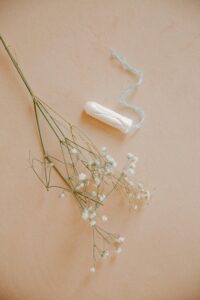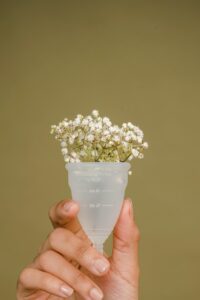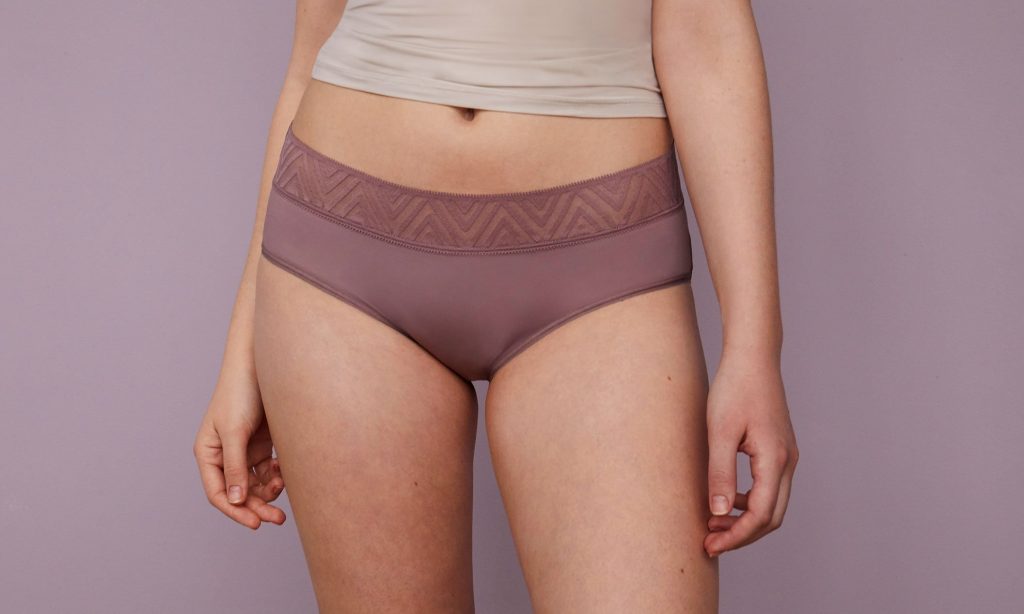Welcome to
the Blog
Replete Wellness
RW
Toxic Tampons + Some Vagina Friendly Alternatives

Your vagina deserves better than toxic tampons, read on for some healthier alternatives;
2024 is officially the year of vaginal health;
Your vagina is lined with a ton of blood vessels and is highly permeable, meaning that anything that touches the inside of your vagina will have a high absorption rate directly into your blood stream. While the vaginal tissue can be an amazing place to absorb bioidentical hormones and certain medications, it will also absorb toxins and chemicals from anything else that you place up there (including bad vibes from toxic men, yuck!). Consequently, all of those nasty chemicals found in your feminine hygiene products are also going to be absorbed into your body. The average woman uses around 16,000 tampons in her lifetime, which means 16,000 possible exposures to the following endocrine disrupting chemicals found in your typical tampon:
- Fragrance: There is absolutely zero reason for tampons to smell like anything other than plain cotton. The chemicals used to add scent to tampons can damage the good bacteria living in your vagina leading to dysbiosis and bacterial vaginosis. Synthetic fragrances also typically contain phthalates; well documented hormone disruptors that have been linked to increased rates of infertility & female gynaecological problems. Vaginas come with odors, it’s normal & natural and there’s no need to change this with a perfumed tampon.
- Plastics: Plastics found in tampon applicators typically contain BPAs, another endocrine disruptor aka something that messes with your hormone levels. When it comes to female fertility, BPA and other endocrine disrupting plastics can accumulate in your follicular fluid and are associated with abnormalities in ovarian development. If you’re still using tampons please switch to cardboard applicators, or even no applicator; the more ecological alternative.
- Pesticides: Cotton is one of the world’s most heavily sprayed crops & as a result there are up to 8 different pesticides lurking in conventional tampons. If using tampons they must be 100% organic otherwise you’re putting pesticides directly into your vagina every cycle. Many of these pesticides act as xenoestrogens, meaning they impact your endocrine system and hormone production. Xenoestrogens are synthetic compounds that mimic estrogen in the body to disrupt normal hormone rhythms and they can even lead to lower thyroid hormone levels.
- Dioxin: This is a nasty chemical byproduct created during the bleaching processes used to make tampons look pretty. Dioxin is highly toxic, can cause hormonal disruption, and is even linked to increased risk of cancer. There are also studies linking dioxin to increased rates of endometriosis. In one study researchers exposed monkeys to dioxin and found significant increases in rates and severity of endometriosis.

SO, WHAT’S A GIRL TO DO?
Here are some (doctor-approved) healthier options for your monthly menses:
- A Menstrual Cup: As bizarre as it may seem at first, the menstrual cup is an excellent alternative to traditional tampons. Made of medical grade silicone it’s an economical, ecological and safe alternative for your monthly flow. Insertion and removal of the cup may take a little bit of practice at first but there are tons of great videos on youtube to help you get comfortable. Not only are menstrual cups safer for your vagina, they’re also a wonderful tool to learn more about your own hormonal health. I like to think of my patient’s flow’s as their ‘monthly health report’. If you pay close attention you will notice changes to flow based on your stress, diet, and alcohol consumption; changes that are not obvious when using tampons or pads. My favourite cup is the diva cup and I suggest buying 2 in your size so you can swap out when needed. One cup will hold an average of 2 – 6 hours worth of flow depending on how heavy your cycles are.
- Organic Tampons: If you’re a die-hard tampon user (and have no desire to switch methods) then I suggest just making the easy switch to organic tampons with cardboard applicators. There are plenty of companies making bleach-free, organic options, they’re just typically not available in a typical grocery or pharmacy. Visit your local health food store or shop online and you’ll find plenty of options. While my personal preference is a diva cup + thinx (see below), these organic tampons are great while travelling. I realize that organic tampons are more expensive than traditional tampons, but your vagina is worth it, girl!
- Period Underwear: Period panties are a washable, stylish, reusable period underwear that absorbs your flow. They are a more sustainable solution than single-use disposable products and can replace pads / tampons or be worn with cups for extra protection. Amazingly, 1 pair holds around 2 tampons worth of flow so they can definitely be used as a stand alone for your menses. While organic tampons and menstrual cups are wonderful for heavier flow days, traditional Chinese medicine encourages women to flow freely when possible to avoid disrupting the flow of qi. We personally use organic tampons or a diva cup on days 1 – 2 then switch to period panties for the last couple days of flow (yes we have vaginas, & are not ashamed to talk about menstruation it on the internet!). Note; there’s been some controversy online lately about the possibility of endocrine-disrupting chemicals popping up in the lining of some popular brands. Make sure to look for a PFA-free brand like Saalt or Aisle.

The average woman spends around 2,000 days of their life menstruating. That’s 2,000 days to expose your vagina to toxic chemicals, or 2,000 days to give your lady parts some love. Your vagina deserves better than toxic tampons, and I strongly encourage your to check out some of these healthier alternatives and to invest wisely when it comes to your menstrual health.
If you’d like to work together you can book online with Dr. Sarah here.
*Note: online services only provided at this time.
References:
- https://www.ncbi.nlm.nih.gov/pubmed/24583634
- https://www.ncbi.nlm.nih.gov/pubmed/8253297
- https://www.sciencedirect.com/science/article/pii/S0890623818302259
This information is not intended as a substitute for the advice provided by your Naturopathic doctor or primary care physician. Do not use the information in this document for diagnosing or treating a health problem or disease. Always speak with your Naturopathic doctor before taking any medication or nutritional or herbal or using any treatment for a health problem. If you have or suspect that you have a medical problem, contact your health care provider promptly. Do not disregard professional medical advice or delay in seeking professional advice because of something you have read online.
+ COMMENTS